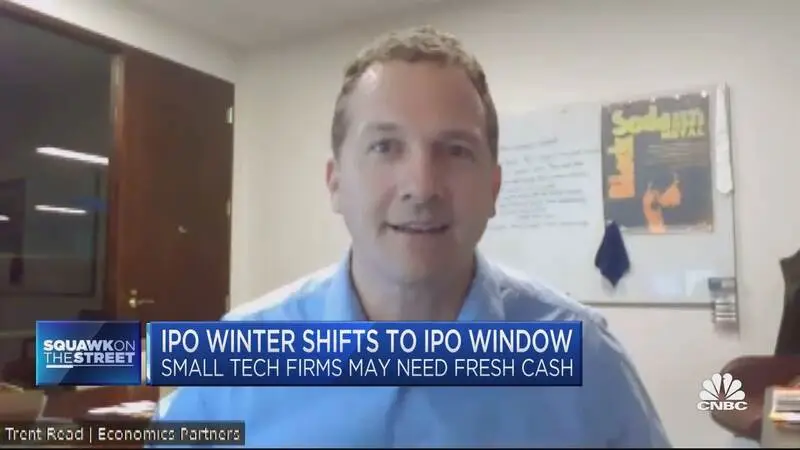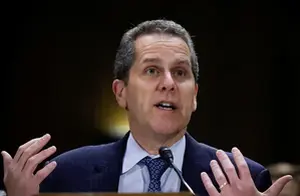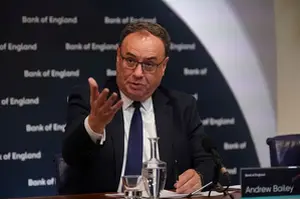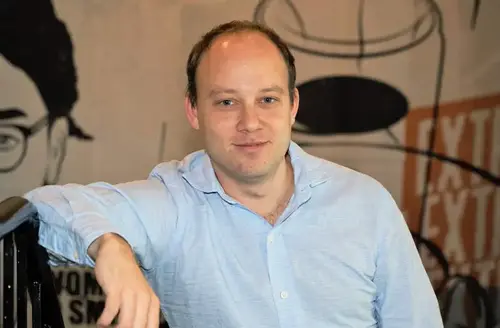
SVB collapse is double-whammy for tech startups already navigating brutal market
ChartHop CEO Ian White breathed a major sigh of relief in late January after his cloud software startup raised a $20 million funding round. He'd started the process six months earlier during a brutal period for tech stocks and a plunge in venture funding.
For ChartHop's prior round in 2021, it took White less than a month to raise $35 million. The market turned against him in a hurry.
"There was just a complete reversal of the speed at which investors were willing to move," said White, whose company sells cloud technology used by human resources departments.
Whatever comfort White was feeling in January quickly evaporated last week. On March 16 — a Thursday — ChartHop held its annual revenue kickoff at the DoubleTree by Hilton Hotel in Tempe, Arizona. As White was speaking in front of more than 80 employees, his phone was blowing up with messages.
White stepped off stage to find hundreds of panicked messages from other founders about Silicon Valley Bank, whose stock was down more than 60% after the firm said it was trying to raise billions of dollars in cash to make up for deteriorating deposits and ill-timed investments in mortgage-backed securities.
Startup executives were scrambling to figure out what to do with their money, which was locked up at the 40-year-old firm long known as a linchpin of the tech industry.
"My first thought, I was like, 'this is not like FTX or something,'" White said of the cryptocurrency exchange that imploded late last year. "SVB is a very well-managed bank."
But a bank run was on, and by Friday SVB had been seized by regulators in the second-biggest bank failure in U.S. history. ChartHop banks with JPMorgan Chase, so the company didn't have direct exposure to the collapse. But White said many of his startup's customers held their deposits at SVB and were now uncertain if they'd be able to pay their bills.
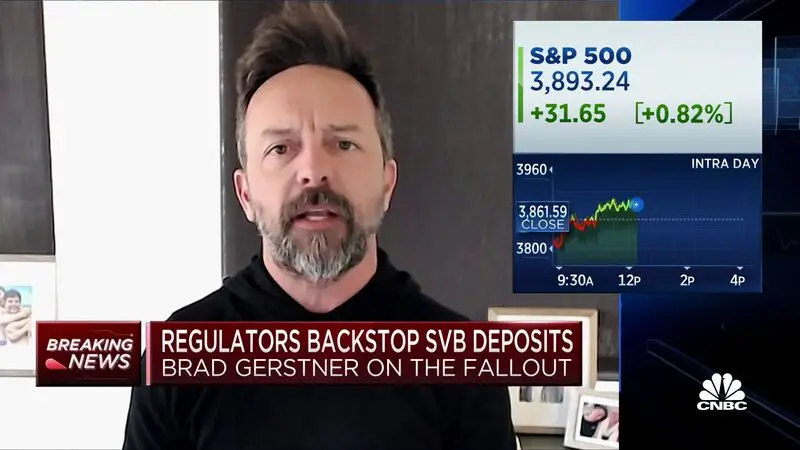
While the deposits were ultimately backstopped last weekend and SVB's government-appointed CEO tried to reassure clients that the bank was open for business, the future of Silicon Valley Bank is very much uncertain, further hampering an already troubled startup funding environment.
SVB was the leader in so-called venture debt, providing loans to risky early-stage companies in software, drug development and other areas like robotics and climate-tech. Now it's widely expected that such capital will be less available and more expensive.
White said SVB has shaken the confidence of an industry already grappling with rising interest rates and stubbornly high inflation.
Exit activity for venture-backed startups in the fourth quarter plunged more than 90% from a year earlier to $5.2 billion, the lowest quarterly total in more than a decade, according to data from the PitchBook-NVCA Venture Monitor. The number of deals declined for a fourth consecutive quarter.
In February, funding was down 63% from $48.8 billion a year earlier, according to a Crunchbase funding report. Late-stage funding fell by 73% year-over-year, and early-stage funding was down 52% over that stretch.
'World was falling apart'
CNBC spoke with more than a dozen founders and venture capitalists, before and after the SVB meltdown, about how they're navigating the precarious environment.
David Friend, a tech industry veteran and CEO of cloud data storage startup Wasabi Technologies, hit the fundraising market last spring in an attempt to find fresh cash as public market multiples for cloud software were plummeting.
Wasabi had raised its prior round a year earlier, when the market was humming, IPOs and special purpose acquisition companies (SPACs) were booming and investors were drunk on low interest rates, economic stimulus and rocketing revenue growth.
By last May, Friend said, several of his investors had backed out, forcing him to restart the process. Raising money was "very distracting" and took up more than two-thirds of his time over nearly seven months and 100 investor presentations.
"The world was falling apart as we were putting the deal together," said Friend, who co-founded the Boston-based startup in 2015 and previously started numerous other ventures including data backup vendor Carbonite. "Everybody was scared at the time. Investors were just pulling in their horns, the SPAC market had fallen apart, valuations for tech companies were collapsing."
Friend said the market always bounces back, but he thinks a lot of startups don't have the experience or the capital to weather the current storm.
"If I didn't have a good management team in place to run the company day to day, things would have fallen apart," Friend said, in an interview before SVB's collapse. "I think we squeaked through, but if I had to go back to the market right now and raise more money, I think it'd be extremely difficult."
In January, Tom Loverro, an investor with Institutional Venture Partners, shared a thread on Twitter predicting a "mass extinction event" for early and mid-stage companies. He said it will make the 2008 financial crisis "look quaint."
Loverro was hearkening back to the period when the market turned, starting in late 2021. The Nasdaq hit its all-time high in November of that year. As inflation started to jump and the Federal Reserve signaled interest rate hikes were on the way, many VCs told their portfolio companies to raise as much cash as they'd need to last 18 to 24 months, because a massive pullback was coming.
In a tweet that was widely shared across the tech world, Loverro wrote that a "flood" of startups will try to raise capital in 2023 and 2024, but that some will not get funded.
Next month will mark 18 months since the Nasdaq peak, and there are few signs that investors are ready to hop back into risk. There hasn't been a notable venture-backed tech IPO since late 2021, and none appear to be on the horizon. Meanwhile, late-stage venture-backed companies like Stripe, Klarna and Instacart have been dramatically reducing their valuations.
In the absence of venture funding, money-losing startups have had to cut their burn rates in order to extend their cash runway. Since the beginning of 2022, roughly 1,500 tech companies have laid off a total of close to 300,000 people, according to the website Layoffs.fyi.
Kruze Consulting provides accounting and other back-end services to hundreds of tech startups. According to the firm's consolidated client data, which it shared with CNBC, the average startup had 28 months of runway in January 2022. That fell to 23 months in January of this year, which is still historically high. At the beginning of 2019, it sat at under 20 months.
Madison Hawkinson, an investor at Costanoa Ventures, said more companies than normal will go under this year.
"It's definitely going to be a very heavy, very variable year in terms of just viability of some early-stage startups," she told CNBC.
Hawkinson specializes in data science and machine learning. It's one of the few hot spots in startup land, due largely to the hype around OpenAI's chatbot called ChatGPT, which went viral late last year. Still, being in the right place at the right time is no longer enough for an aspiring entrepreneur.
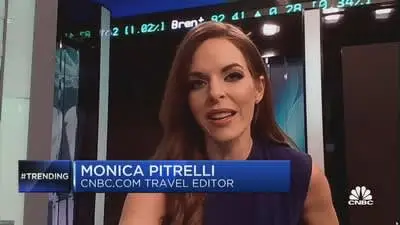
Founders should anticipate "significant and heavy diligence" from venture capitalists this year instead of "quick decisions and fast movement," Hawkinson said.
The enthusiasm and hard work remains, she said. Hawkinson hosted a demo event with 40 founders for artificial intelligence companies in New York earlier this month. She said she was "shocked" by their polished presentations and positive energy amid the industrywide darkness.
"The majority of them ended up staying till 11 p.m.," she said. "The event was supposed to end at 8."
Founders 'can't fall asleep at night'
But in many areas of the startup economy, company leaders are feeling the pressure.
Matt Blumberg, CEO of Bolster, said founders are optimistic by nature. He created Bolster at the height of the pandemic in 2020 to help startups hire executives, board members and advisers, and now works with thousands of companies while also doing venture investing.
Even before the SVB failure, he'd seen how difficult the market had become for startups after consecutive record-shattering years for financing and an extended stretch of VC-subsidized growth.
"I coach and mentor a lot of founders, and that's the group that's like, they can't fall asleep at night," Blumberg said in an interview. "They're putting weight on, they're not going to the gym because they're stressed out or working all the time."
VCs are telling their portfolio companies to get used to it.
Bill Gurley, the longtime Benchmark partner who backed Uber, Zillow and Stitch Fix, told Bloomberg's Emily Chang last week that the frothy pre-2022 market isn't coming back.
"In this environment, my advice is pretty simple, which is — that thing we lived through the last three or four years, that was fantasy," Gurley said. "Assume this is normal."
Laurel Taylor recently got a crash course in the new normal. Her startup, Candidly, announced a $20.5 million financing round earlier this month, just days before SVB became front-page news. Candidly's technology helps consumers deal with education-related expenses like student debt.
Taylor said the fundraising process took her around six months and included many conversations with investors about unit economics, business fundamentals, discipline and a path to profitability.
As a female founder, Taylor said she's always had to deal with more scrutiny than her male counterparts, who for years got to enjoy the growth-at-all-costs mantra of Silicon Valley. More people in her network are now seeing what she's experienced in the almost seven years since she started Candidly.
"A friend of mine, who is male, by the way, laughed and said, 'Oh, no, everybody's getting treated like a female founder,'" she said.
WATCH: Cash crunch could lead to more M&A and quicker tech IPOs
